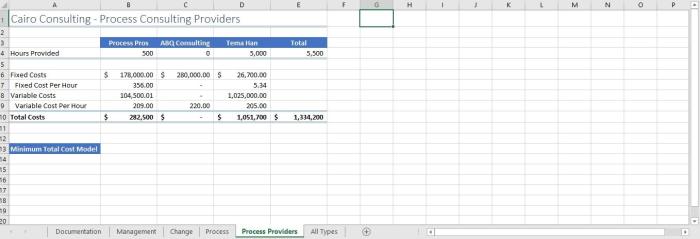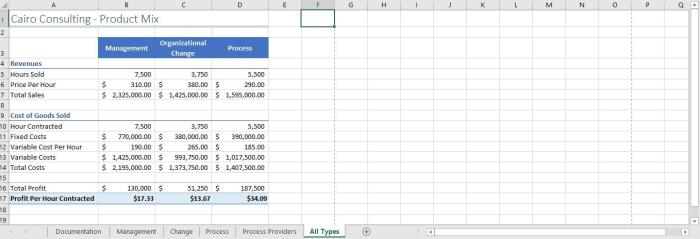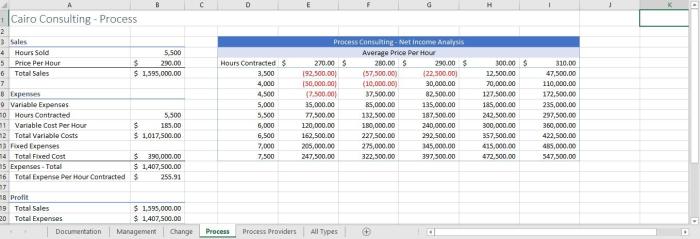Cairo consulting explore business options with what-if tools – In today’s dynamic business environment, Cairo Consulting empowers organizations to navigate complex decision-making with the strategic use of what-if tools. This innovative approach enables businesses to explore a range of potential outcomes, mitigate risks, and optimize their decision-making processes.
What-if tools are powerful analytical instruments that allow businesses to simulate different scenarios and assess the potential impact of various decisions. By leveraging these tools, Cairo Consulting provides clients with a comprehensive understanding of the potential consequences of their choices, enabling them to make informed and data-driven decisions.
Cairo Consulting: Exploring Business Options with What-If Tools: Cairo Consulting Explore Business Options With What-if Tools
Cairo Consulting is a leading provider of business advisory services, offering a range of solutions to help clients optimize their operations and achieve growth. One of the key tools used by Cairo Consulting is what-if analysis, which enables clients to explore different business scenarios and make informed decisions based on data-driven insights.
What-if tools are powerful analytical instruments that allow businesses to model various scenarios and assess their potential outcomes. By varying input parameters and assumptions, businesses can simulate different conditions and evaluate the impact on key performance indicators (KPIs) such as revenue, expenses, and profitability.
Understanding What-If Tools

What-if tools are designed to help businesses make better decisions by providing a platform for exploring different possibilities. They are particularly useful in situations where there is uncertainty or multiple factors to consider, as they allow businesses to test different assumptions and identify the most optimal course of action.
There are different types of what-if tools available, each with its own strengths and applications. Some common types include:
- Scenario planning tools:These tools allow businesses to create and evaluate multiple scenarios, each representing a different set of assumptions and conditions.
- Sensitivity analysis tools:These tools help businesses understand how changes in input parameters affect the output of a model. They can be used to identify the most influential factors and assess the robustness of a plan.
- Optimization tools:These tools help businesses find the best possible solution to a problem, given a set of constraints and objectives.
Benefits of Using What-If Tools

There are numerous benefits to using what-if tools for business planning. Some of the key advantages include:
- Improved decision-making:What-if tools provide businesses with a structured and data-driven approach to decision-making, reducing the risk of making costly mistakes.
- Risk mitigation:By exploring different scenarios, businesses can identify potential risks and develop strategies to mitigate them.
- Optimization of outcomes:What-if tools can help businesses optimize their operations and make better use of their resources, leading to improved profitability and growth.
Case Study: Exploring Business Options with Cairo Consulting

To illustrate the practical application of what-if tools, let’s consider the case of a manufacturing company that was facing declining sales. Cairo Consulting was engaged to help the company explore different business options and identify the most promising path forward.
Using what-if analysis, Cairo Consulting developed a series of scenarios that explored different product strategies, market segments, and pricing models. The results of the analysis showed that the company could significantly increase its revenue by expanding into a new market segment with a differentiated product offering.
Based on the insights gained from the what-if analysis, the company implemented a new business strategy that resulted in a 20% increase in sales within the first year.
Best Practices for Using What-If Tools
To effectively use what-if tools for business planning, it is important to follow certain best practices:
- Set clear goals and assumptions:Before using what-if tools, it is essential to clearly define the goals of the analysis and the assumptions that will be used.
- Use accurate data:The accuracy of the results of what-if analysis depends on the quality of the data used. It is important to ensure that the data is reliable and up-to-date.
- Interpret and analyze the results carefully:The results of what-if analysis should be carefully interpreted and analyzed. It is important to consider the limitations of the tools and the assumptions used.
FAQ Compilation
What are the benefits of using what-if tools in business decision-making?
What-if tools provide several benefits, including the ability to explore different scenarios, assess potential risks, optimize outcomes, and make informed decisions based on data analysis.
How does Cairo Consulting assist clients in utilizing what-if tools?
Cairo Consulting provides comprehensive services to guide clients in using what-if tools effectively. This includes defining clear goals, selecting appropriate tools, conducting scenario analyses, and interpreting results to support strategic decision-making.
Can you provide an example of how Cairo Consulting has helped clients with what-if tools?
In one instance, Cairo Consulting assisted a manufacturing company in evaluating the impact of expanding into a new market. Using what-if tools, the company simulated various scenarios and analyzed potential outcomes, enabling them to make an informed decision that maximized their chances of success.